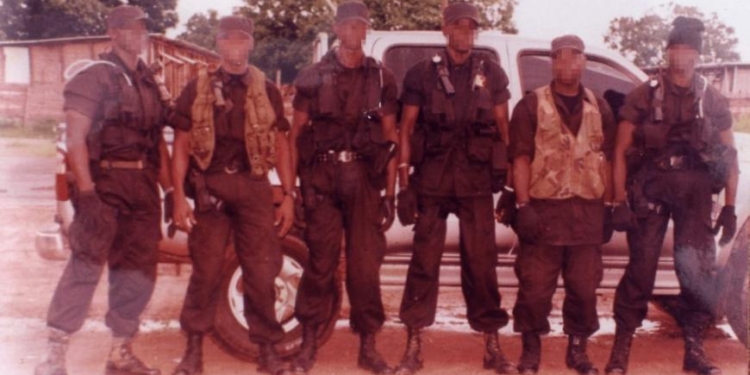By Waceke Njoroge
The Gambia’s Truth, Reconciliation and Reparations Commission wants former president Yahya Jammeh and members of his personal squad of killers, the Junglers, prosecuted for the crimes that the illegal unit committed at the behest of the dictator.
In its report handed to Gambian President Adama Barrow in November 2021, and released to the public a month later, the commission recommends that the former head of state, who for 22 years ruled the tiny West African with an iron fist, be barred from ever holding public office in The Gambia.
The TRRC finds that Jammeh created the clandestine Junglers, at first referred to as the Patrol Team, within the army and used the unit to enforce his power by repressing anyone considered to be a critic or a threat to his administration. The Junglers, who were solely loyal to the president and followed his orders without any question or hesitation, committed crimes such as extra-judicial killings, arbitrary arrests, detentions, and torture on Jammeh’s orders.
The maiden training of the Junglers was credited to Francisco Caso, an Italian mafioso who had come to The Gambia as a tourist. He was introduced and recommended to Jammeh by Abdoulie Kujabi, the National Intelligence Agency (NIA) Director General at the time. Caso was originally supposedly to work with Almamo Manneh, who is said to have sought his assistance to plan a coup against Jammeh in 2000. He allegedly betrayed Almamo Manneh and switched his loyalties to the president, proving his skills by training the small group of soldiers. Almamo Manneh was later executed by the Junglers.
“The specialised training became known as the ‘jungler training’, which entailed counter-terrorism and VIP security. During the training, live ammunition was used and the soldiers were equipped with skills to kill. The criteria for selection of soldiers to the jungler training largely depended on presupposed and perceived loyalty to President Jammeh. About fifteen soldiers participated in the first training course,” the report says.
The TRRC describes Jammeh’s dictatorial rule as being characterised by human rights violations, including enforced disappearances, torture, arbitrary killings, and unlawful detentions. These crimes were systemically carried out by state security apparatus such as NIA, the Gambia Police Force, and the Gambia National Army, “pursuant to a state-orchestrated policy, to deliberately silence any form of opposition and threat to Jammeh’s reign”.
According to the report, the group’s covert operations were an open secret in the army but the public became aware of their existence in 2006. It highlighted “the arson attack on The Independent newspaper and the cruel aftermath of Ndure Cham’s foiled coup. It was then that they became known as ‘black black’, derived from their dark dress code during their operations.”
The TRRC says Jammeh controlled the Junglers, determining where members were posted and stayed. He kept direct contact with group commanders such as Tumbul Tamba, Saul Badjie, Solo Bojang, and Sanna Manjang, and would even communicate directly with the teams and oversee their activities while they were on operations.
He would ask for proof of the execution of his orders – be it a killing or torture – so the Junglers would record their activities, putting their phones on speaker or recording videos so that Jammeh would hear or see what was going on. According to some of the Junglers who testified before the truth commission, the president would reward them with cash gifts, feasts, or promotions.
The report says the Junglers created a repressive environment, thus helping Jammeh to accomplish his mission of entrenching and perpetuating his dictatorship as Gambians became more and more frightened of their leader, voting him into office year after year out of fear.
The Junglers identified and targeted victims using three category criteria, the report says. First were those Jammeh perceived to be security threats. These include Dawda Nyassi, who had fought in the Liberian war; the West Africans migrants; suspected coup plotters Saul Ndow and Mahawa Cham in 2013; Daba Marenah and his group including Ebou Lowe, Alpha Bah, Alieu Ceesay, and Malafi Corr, who were accused of involvement in a foiled coup in 2006; and Gambian-American businessmen Ebou Jobe and Mamut Ceesay.
There were also the vocal Jammeh critics who challenged and condemned his violations. These include veteran journalist Deyda Hydara, who was shot dead in 2004, and Haruna Jammeh and Masi Jammeh, the president’s relatives.
Then there were the business and close associates who fell out of favour with Jammeh, such as Baba Jobe, Ceesay Bujuling, Tumbul Tamba, and Musa Jammeh.
Some of accounts given by the Junglers, who confessed during the commission’s public hearings, incriminated Jammeh and the illegal hit squad. They confessed to the unlawful killing of Almamo Manneh, a member of the State Guards suspected of plotting to overthrow Jammeh together with Lieutenant Landing Sanneh in 2000.
To curb Jammeh-era excesses, the TRRC recommends the introduction of a mandatory course for all soldiers on human rights and the role of the military in a democratic society. Further, it suggests that a mechanism be put in place to identify the burial sites of the victims of the Junglers, exhume their remains, and conduct their proper identification with a view to handing them over to their families for proper burial. It suggests that former Jungler Solo Bojang be located and his cooperation enlisted to identify the burial sites because he has extensive knowledge of the disposal grounds.
It also asks for further investigation of the killing of Mariama Camara, a Gambia Armed Forces soldier attached to the State House, and her husband, Alpha Jallow, at Hamza Barracks. The TRRC could not confirm claims that Jammeh ordered Mariama’s murder because of a sexual relationship he had with her.







